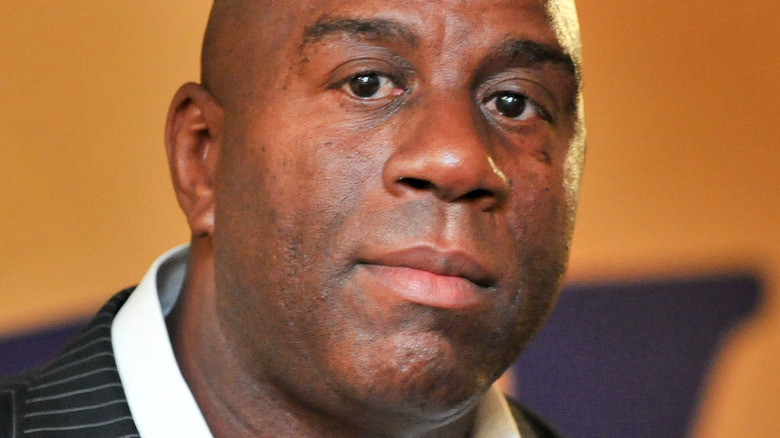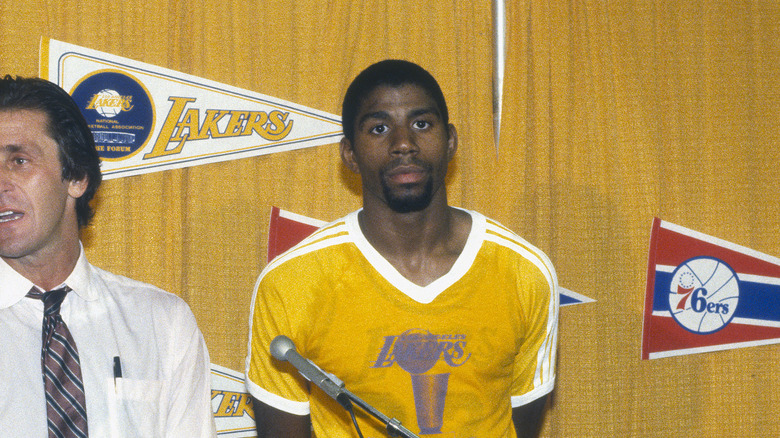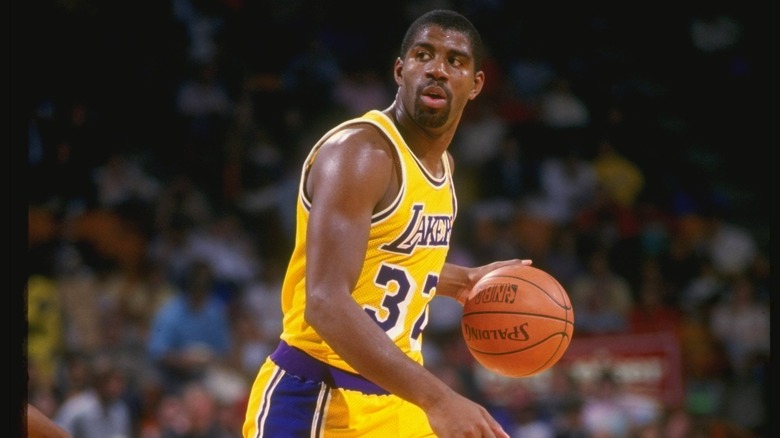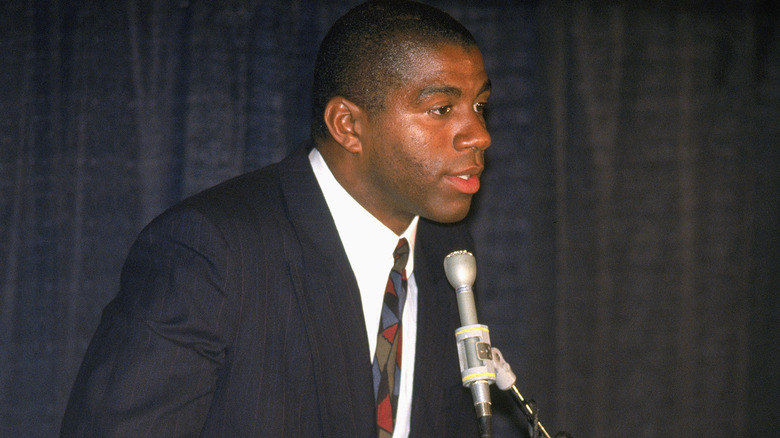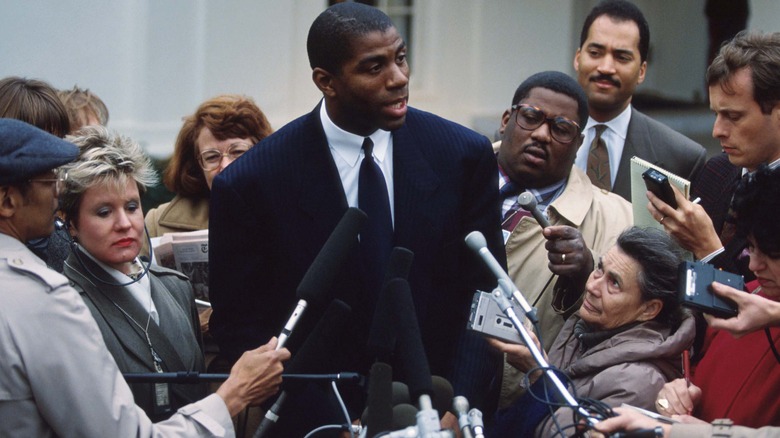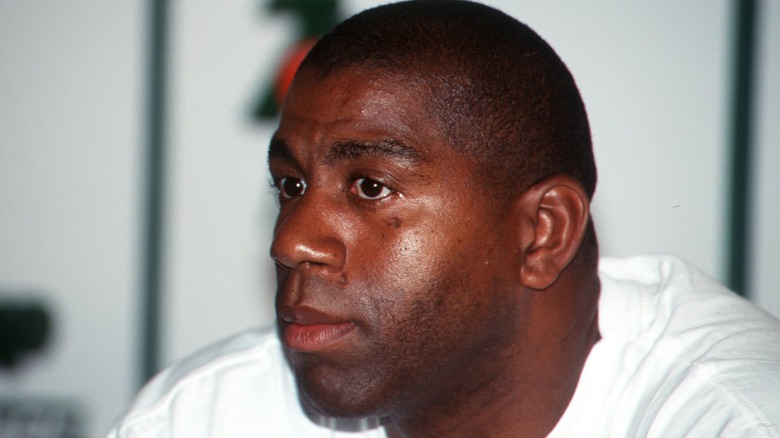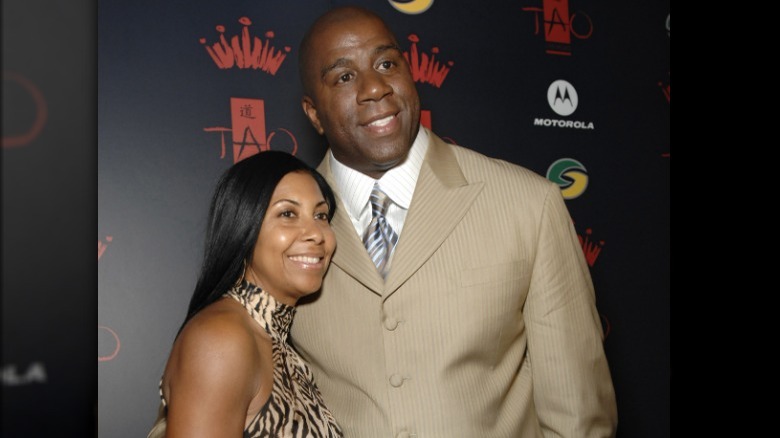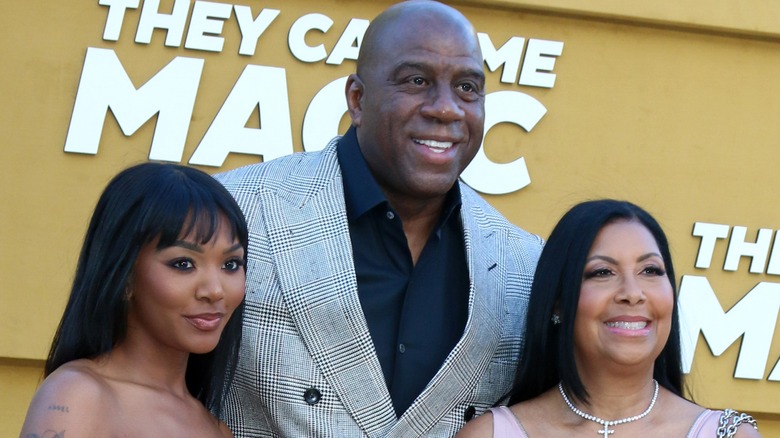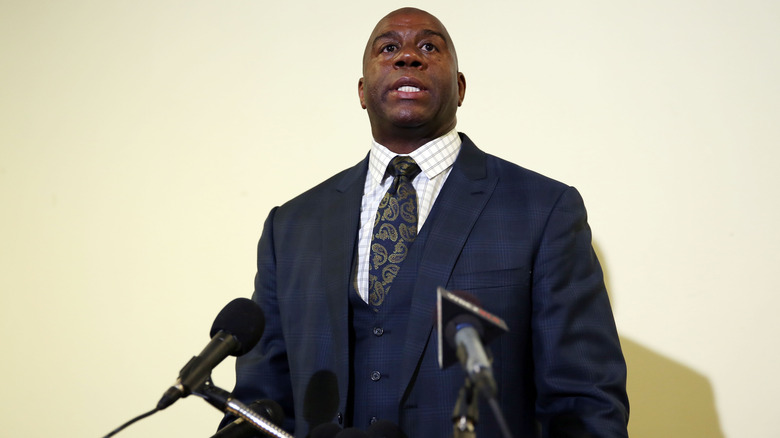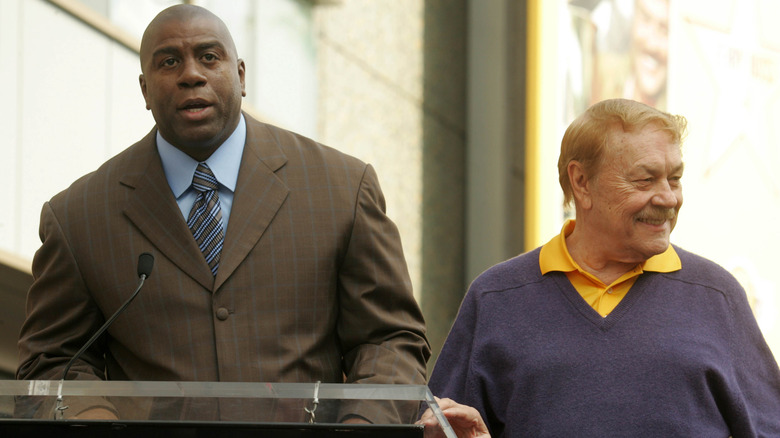Tragic Details About Magic Johnson
This feature discusses racism.
Even if Earvin Johnson's nickname is Magic, the basketball star didn't always have a charmed life. Growing up in Michigan during the '60s and '70s, he had his heart set on going to his neighborhood school, Sexton High, and playing for their notoriously mighty basketball team. Instead, Johnson and his siblings were bused into a white-majority school where white parents had pulled their own kids out of schools to protest the new arrivals, and rocks were thrown at their buses. "Busing was still relatively new; we were only the second group of black kids to attend the school," he recalled in his memoir, "My Life."
Tensions were great when he started playing basketball for his new school, Everett High, and a rivalry sprung up between the Black and white teammates. But years later, Johnson had a different perspective. "It's true that I hated missing out on Sexton. And the first few months, I was miserable at Everett," he wrote. "But being bused to Everett turned out to be one of the best things that ever happened to me. It got me out of my own little world and taught me how to understand white people, how to communicate and deal with them."
Sadly, the NBA legend has faced various unexpected obstacles, heartbreaks, and curveballs throughout his life. Nevertheless, as these tragic details about Magic Johnson repeatedly prove, he's always stood strong in the face of adversity.
His best friend died in a car crash
Magic Johnson experienced a tragic loss at a young age when his best friend was killed in a car crash. Reggie Chastine, who he met at high school, was the one who first encouraged him to dream bigger about basketball. "He was a feisty little guy, no more than five feet three, but he had the heart of a giant," Johnson wrote in "My Life," recalling how Chastine played as a starter despite his height and often told him that he had the potential to be a great athlete. "The two of us were inseparable. We looked so funny together that people called us Mutt and Jeff."
The summer before Johnson's senior year, Chastine was hit and killed by an alleged drunk driver who ran a stop light. "This was my first experience with death, and it was devastating," Johnson reflected, adding that their entire community was shattered. "Everybody loved Reggie, this scrappy little fighter." He was one of the pallbearers at Chastine's funeral, along with their other teammates, and was deeply affected by the experience. As he told the Los Angeles Times, Johnson was inspired by Chastine and their high school games throughout his life. "It takes not only being good, you have to have that drive ... Reggie taught me that," he added. "He was the first one who really believed in me. I doubted myself, but he was looking to big things."
A serious knee injury set him back
After a strong rookie season in the NBA, Magic Johnson had to miss 45 games in his second year with the Lakers because of torn cartilage in his left knee. In "My Life," he explained that the injury came from a collision with Hawks player Tom Burleson, who had a knee brace made from iron at the time. "This was my worst nightmare," Johnson wrote. He added that he was completely unprepared for the upheaval because he had managed to avoid any career-threatening accidents up until that point, and hadn't missed a game yet from injuries. His parents helped him through the surgery, which left him unable to walk for three days. "It was awful," he explained. "I hate losing, and I was losing big time with this."
The star wound up missing play for a total of 100 days. When he came back for a game against the New Jersey Nets, Johnson was greeted by a standing ovation from his fans and teammates. He told the press that his time away had given him a fresh perspective. "It made me see that, just as fast as you can rise to the top, you can come tumbling down," he observed, insisting that losing the camaraderie with his teammates was the worst part. "That's my life, being around the fellas, talking jive, singing on the bus, that's the whole thing."
Magic Johnson found out he was HIV positive
In one of the most pivotal moments in sports history, Magic Johnson told the world that he was HIV positive in 1991. Per ESPN, the basketball star was diagnosed after a regular check-up and was urgently flown back to Los Angeles afterward. When he received his results, the dumbfounded NBA star demanded that the team physicians test him two more times before he fully believed them. As he later admitted to NPR, Johnson found that telling his wife Cookie was the most difficult part of the whole experience. "Not knowing what she was gonna do, her reaction," he explained. After the basketball star reassured her that he would understand if she left him, Cookie reportedly hit him and declared, "You know what, we're gonna beat this together."
Johnson announced in a press conference that he was quitting the team to focus on his health. "Because of the HIV virus I have attained, I will have to retire from the Lakers today," he announced, clarifying that he did not actually have AIDS and that he was going to live with the help of medication. "I plan on going on, living for a long time, bugging you guys like I always have," he joked, promising to help defeat stigma as a national spokesman about HIV. "Here I am saying that it can happen to anybody, even me," the sportsman added. "... I'm going to go on. I'm going to beat this, and I'm going to have fun."
He was mocked by the media after going public
Despite his bravery in telling the world, Magic Johnson became the subject of a lot of jokes after his HIV diagnosis. Shock jock, Howard Stern had been particularly persistent on his radio show, so when Johnson was given his own talk show, "The Magic Hour," the controversial radio star became a guest. Six years earlier, Johnson had written about how he'd contracted the virus in "My Life" (via Chicago Tribune), stating that he'd been sexually promiscuous with female Lakers fans during the '80s.
Naturally, this sat at the heart of Stern's mockery, as he joked during the notorious interview, "At least you had fun getting AIDS." When Johnson tried to interject, clarifying that he didn't have AIDS and that no part of his HIV journey had been fun, the provocateur kept going, sneering, "Believe me, brother, you did. It sounds like fun to me." Stern also loaded his appearance with continual racially charged comments.
Reflecting on the episode with Variety years later, Johnson revealed that he was furious when he found out the controversial guest had been booked for his show. He could barely contain his frustration during filming, stating, "So many times, I wanted to say something and hit [Stern]." He swore that he'd never just smile and tolerate similar situations in the future – no matter how many TV executives talked him into it. "I've never put myself — or HIV and AIDS, or my race — in that position ... ever again," he explained.
Magic was pressured into retiring again
Although Magic Johnson returned to the Lakers in 1992 after playing in the Barcelona Olympics, other players were still openly hesitant about playing against him — despite the lack of evidence that anyone could contract HIV from him on the court. "Look at this, scabs and cuts all over me," Utah Jazz player Karl Malone told reporters, per The New York Times. "... They can't tell you that you're not at risk, and you can't tell me there's one guy in the N.B.A. who hasn't thought about it."
Johnson announced his retirement a couple of months later, telling the Los Angeles Times, "I didn't want to hurt the game." He later expressed regret over this decision. "If I knew what I know now, I wouldn't have retired," he reflected. "But I didn't know that then. And you've just got to go with what happened." As Johnson reminded Variety, research around HIV was limited at the time and there was a lot of misinformation being spread about the virus — he had to move forward cautiously. "So it kicked in that I had to go out and educate people," he said.
Johnson put a lot of effort into publicizing the fight against the virus — something that factored into his decision to quit the Bush administration's AIDS commission after just eight months. In his resignation later, per The Baltimore Sun, he wrote, "I am disappointed that you have dropped the ball and that your administration is not doing everything that it must to fight this disease."
His marriage to Cookie has sometimes crumbled
Magic Johnson and his wife, Cookie Johnson, first became acquainted as freshmen at Michigan State — she quickly tamed his wild ways. "In high school, I was dating all over ... just going crazy," he told the Los Angeles Times. "Then I met this great young lady, a super girl. She brought me down to being a one-woman man." But it wasn't always smooth sailing. In the late '80s he briefly called off their engagement because of his career. And in 2001, the pair had a secret separation that they hid from the media.
On an episode of "SuperSoul Sunday" (via HuffPost), Cookie blamed the split on Johnson's ego. She was focusing on being a mother at the time and her husband was gathering momentum in the business world, staying out later and later. "It just all became about work for him," she explained. The couple reached a breaking point the night after he received his star on the Hollywood Walk of Fame in 2001, over Johnson dancing with some girls rather than his wife. "That kind of got to me because it had been boiling, boiling, boiling, boiling anyway," Cookie admitted. "That was our first kind of spat in public."
As the couple told Ebony (via BET), during their separation, Johnson decided to change his ways while Cookie focused on personal growth. It saved their marriage. "Now we're so connected to each other, but it took that situation to bring us back," he shared.
His daughter was hurt in an armed home invasion
In December 2018, Magic Johnson's daughter, Elisa Johnson, and nine of her friends had a terrifying encounter when two armed men broke into a Californian Airbnb house they were staying in. As reported by TMZ, some of her friends were held at gunpoint by the robbers, who reportedly took between $30,000 and $40,000 in jewelry, cash, and electronics. Meanwhile, Elisa was escaping through a sliding glass door at the back of the property and running to find help from a neighbor.
Thankfully, nobody was seriously injured during the home invasion. However, Elisa later revealed that she'd sustained an injury to her abdomen that had left her scarred. A year after the terrifying ordeal, the eyewear designer bared her marked midriff in a selfie on Instagram and admitted she'd been struggling with how it now looked. "As women, we tend to be very hard on ourselves," Elisa wrote in her caption. "Until now I've been so afraid to show these scars, and incredibly insecure about the way I look. But I now realize these scars are a part of my journey and tell the story of who I am." She added that they now represented her ability to survive in a life-threatening scenario, writing, "I love my scars, and I am proud to be in the place I am today."
In February 2019, TMZ reported that a suspect had been arrested for the robbery. However, a second suspect remained at large.
Magic Johnson faced racism in the NBA
Magic Johnson was at the center of a high-profile scandal in 2014 when TMZ released leaked recordings of Clippers owner, Donald Sterling telling his mistress not to associate with Black basketball players in public. In his comments to V. Stiviano, the NBA higher-up criticized her specifically for posting a picture of herself with Magic Johnson on Instagram. "It bothers me a lot that you want to broadcast that you're associating with Black people," Sterling insisted, adding that while she could see anyone in her private life, he didn't want her to be seen with Black people at games.
Understandably, Johnson expressed his dismay at the racist rant — particularly because he had known Sterling since 1979. "I thought we had a sort of friendship," he told CBS. "... I thought he respected me." Johnson added that his comments were painful because of their hypocrisy, expressing his sympathy for the Black basketball players on the Clippers and the Black tenants of Sterling's buildings. "We're putting a lot of money in his pocket, but at the same time he doesn't want us in the arena," he concluded. "So I think that all of us are outraged."
Johnson also called for him to step down as owner. The NBA clearly agreed with him, since they fined Sterling $2.5 million and gave him a lifetime ban. A month later on CNN, Sterling apologized for his comments and denied that he was racist. Instead, he accused some people — including Johnson — of having conspired against him.
His mentor Jerry Buss died in 2013
In 1979, Magic Johnson and team owner, Jerry Buss, both joined the Lakers. It proved to be a fruitful union at a pivotal time, inspiring each other to greatness, as the team won several championships. Understandably, the two formed a close bond. "We would go to his house on Saturday morning, have breakfast and play pool, and then get on his bus to go stand on the sidelines of USC football games," Johnson told the Los Angeles Times. "Then at night we would go to clubs and, man, he could really dance."
The NBA star credited Buss with revolutionizing basketball as a sport, as well as his own career. "He was a genius, way ahead of his time; the league owes him a lot," Johnson insisted. "Dr. Buss believed in it, he believed in me." After his career with the Lakers ended, the entrepreneur also taught Johnson how to make a living in the world of business. "He brought me in, showed me the books," he recalled. That lifelong bond made Buss's 2013 death particularly difficult for Johnson.
"He had such a big heart," the player stated. "I have lost my second father. I have lost one of my best friends." He revealed that they had spent five hours together at the Cedars-Sinai Medical Center before Buss died, reliving memories and holding hands. "I'm crying right now," Johnson added, recalling his friend's final moments. "Without Dr. Jerry Buss, there is no Magic."

